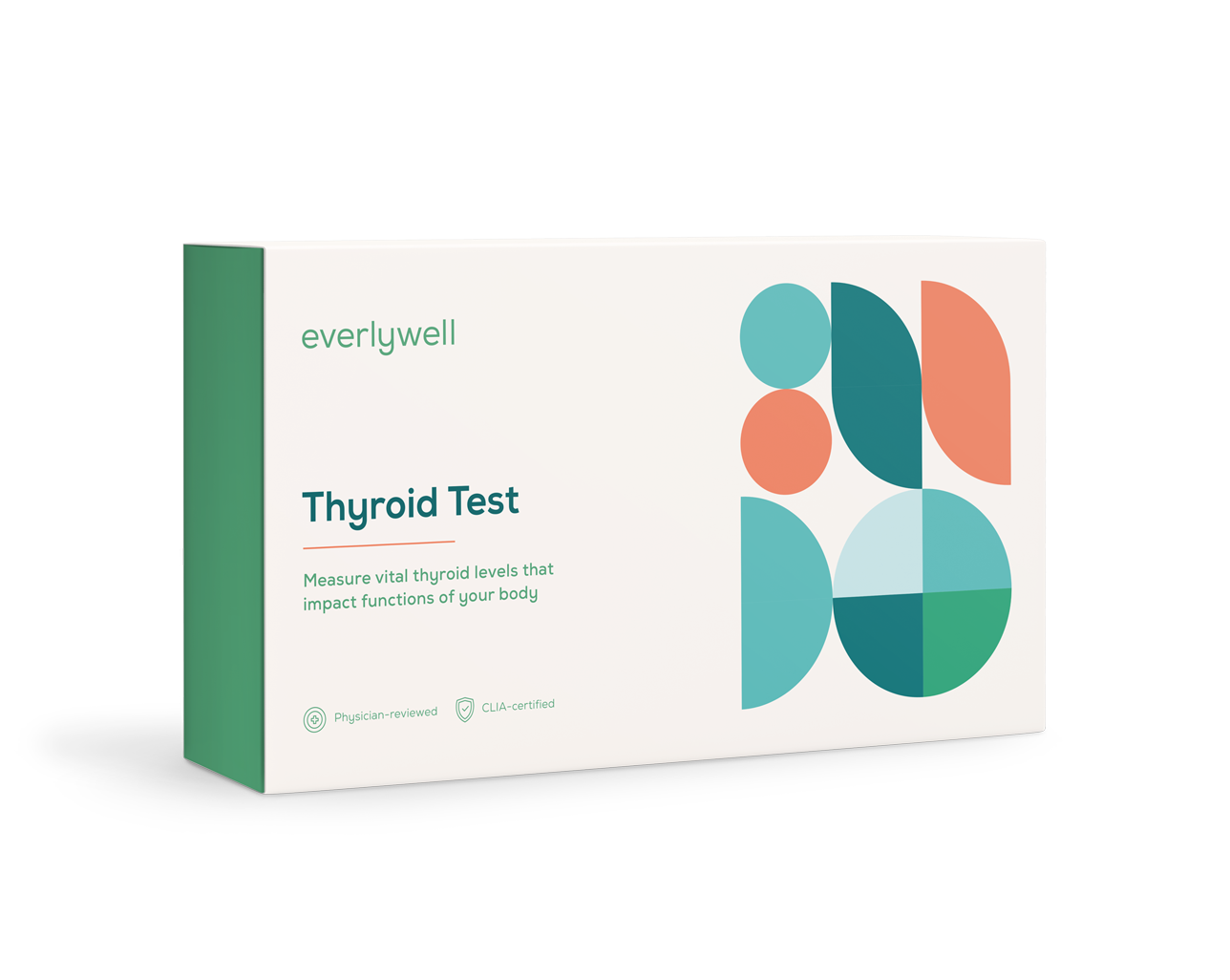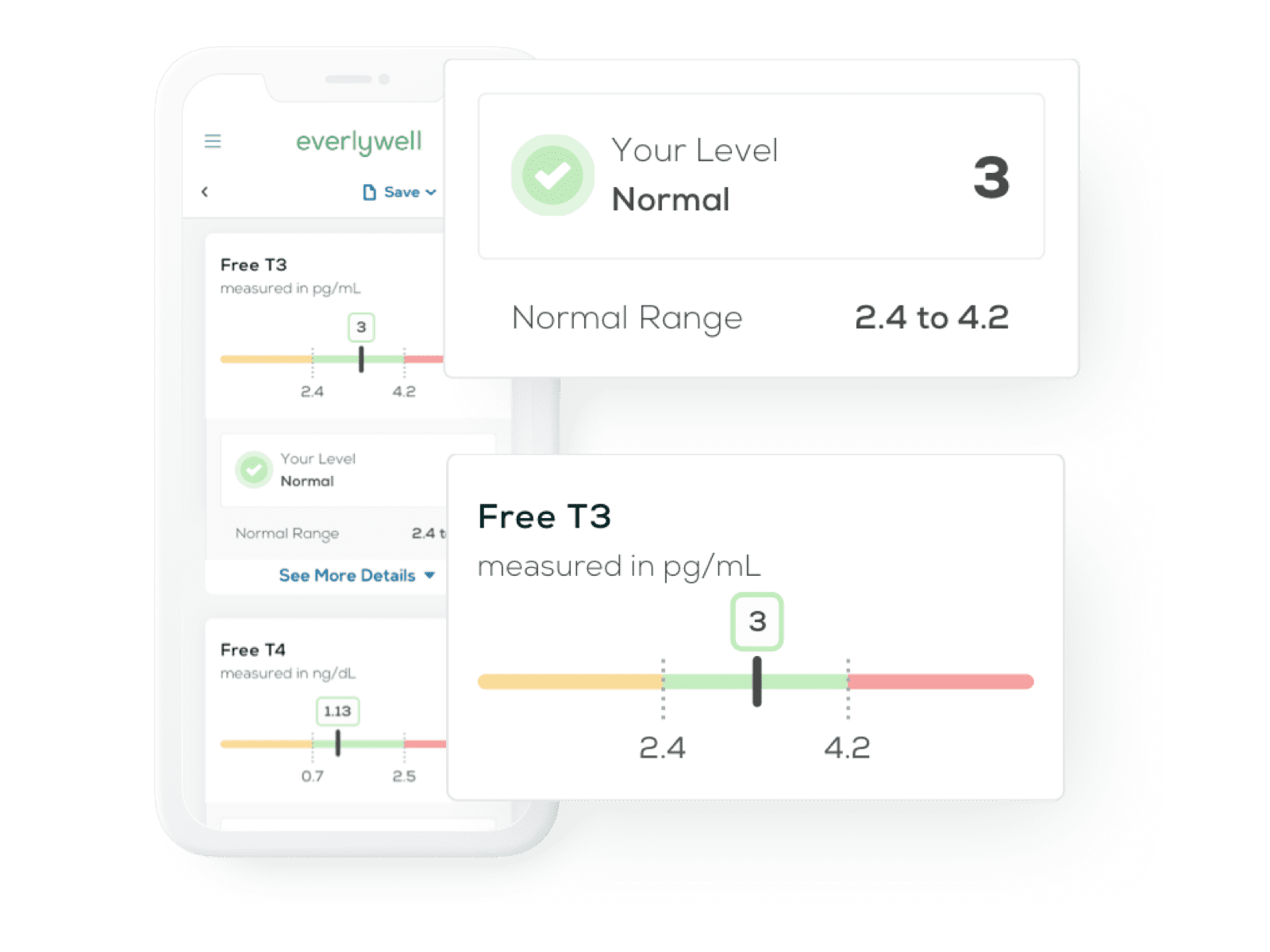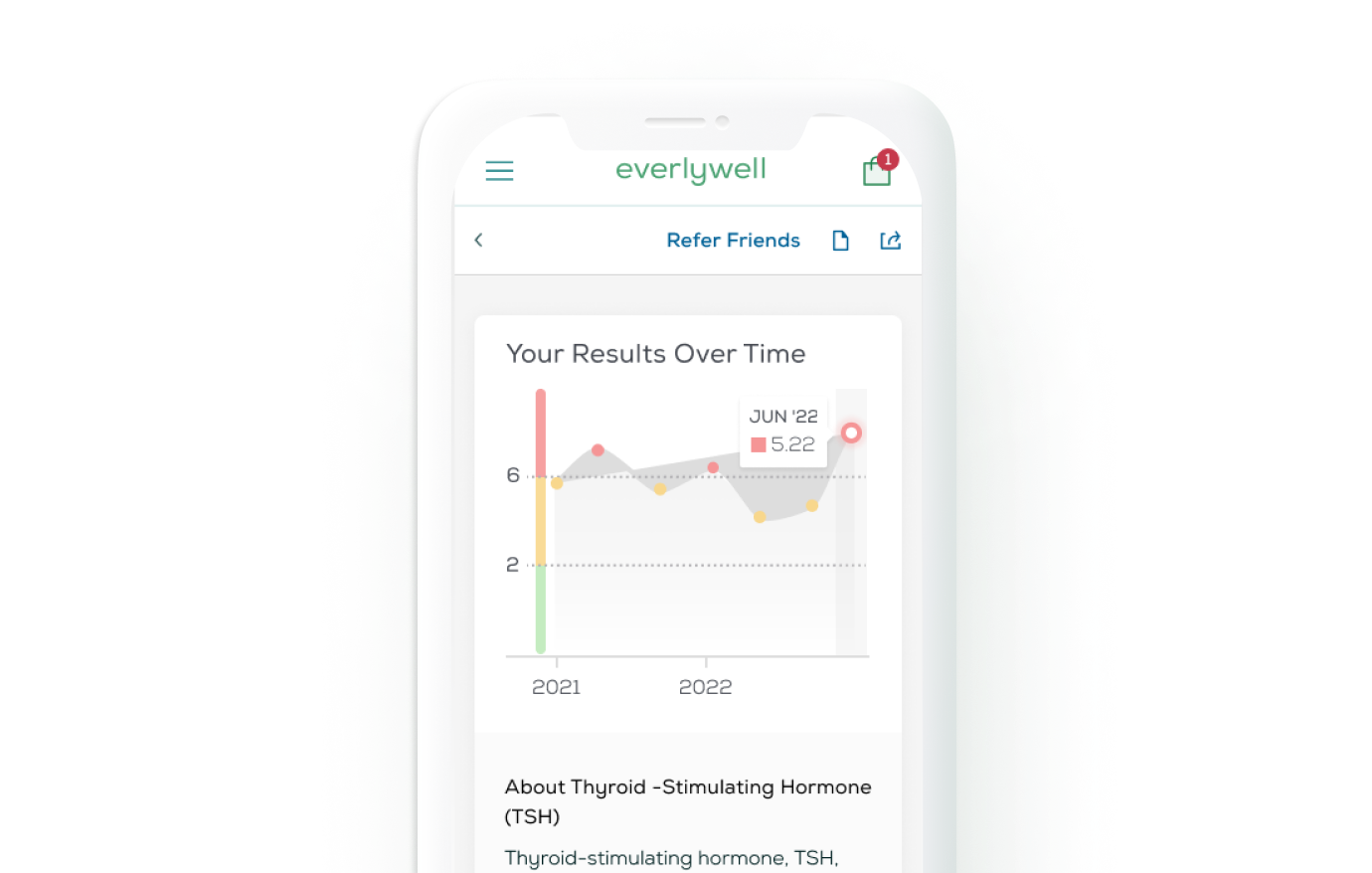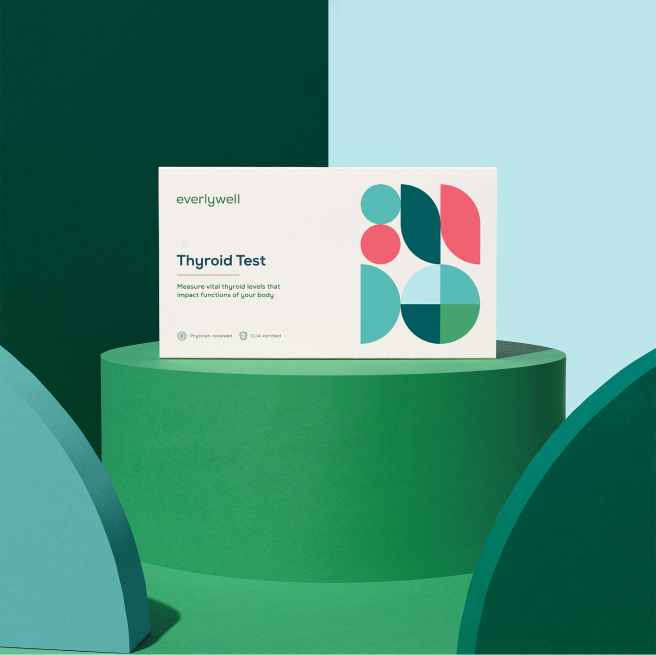























Thyroid Test
$99
Free Shipping • FSA / HSA accepted
Easily measure your levels for the 3 main thyroid hormones (TSH, Free T3, and Free T4) plus thyroid antibodies (TPO).
Finger prick sample collection
Ongoing physician support*
Prescriptions available
*Test takers with qualified abnormal results are eligible for ongoing physician support
Measure vital thyroid levels that impact functions of your body
























Thyroid Test
Easily measure your levels for the 3 main thyroid hormones (TSH, Free T3, and Free T4) plus thyroid antibodies (TPO).
Finger prick sample collection
Ongoing physician support*
Prescriptions available
$99
Select Subscription Frequency
YOU SAVE $25 (25%)
YOU SAVE $20 (20%)
YOU SAVE $15 (15%)
Free Shipping • FSA / HSA accepted
Free Shipping • FSA / HSA accepted
*Test takers with qualified abnormal results are eligible for ongoing physician support
Questions?
Though a part of the body that many people know little about, the thyroid plays a major part in daily wellness.
Both hyperthyroidism and hypothyroidism -- too much thyroid activity and too little thyroid activity, respectively -- are cause for concern. Because your thyroid controls much of your metabolism, which plays a vital role in your overall health, it’s important to monitor thyroid function through a thyroid hormone test. Thyroid scans and thyroid testing may be helpful as it is estimated that up to twelve percent of the population in the United States will develop thyroid disease during their lifetime. That’s almost fifteen million people who have thyroid gland problems that affect their metabolism and are unaware.
Anybody can experience thyroid disorder issues but some people are more susceptible than others:
- Women (up to 10 times more likely than men to have thyroid disorders)
- People with a family history of thyroid issues
- Adults aged 50+
- Individuals with Type 1 Diabetes
- Women who have been pregnant within the past 6 months
- People being treated with lithium for six months or more
- Those with iodine deficiency or exposure
- Smokers
- People who have been exposed to radiation therapy, especially around the neck
Our at-home TSH blood test is quick, easy, and convenient—allowing you to check your levels of the 3 main thyroid hormones without leaving your home.
Working with certified and experienced labs, our thyroid panel uses samples from your blood test to accurately measure various thyroid-specific hormones and compare those thyroid levels to common ranges.
The at-home thyroid test measures free T4, free T3, TSH, and TPO from a small blood spot sample taken with your kit.
TSH (Thyroid Stimulating Hormone) controls thyroid gland function in its production of active thyroid hormones, free T4, and free T3, which together control the rate at which your body uses energy. The thyroid hormone test also measures TPO antibodies, which are antibodies that your body may make that can suppress thyroid function. By measuring your levels of each, you can understand if you may be experiencing thyroid dysfunction.
Everlywell will provide detailed test result information of what a high or low level of TPO, free T4, free T3, or TSH means for your health.
At-home thyroid blood tests are a convenient starting point for determining whether you may have a thyroid condition and will give you indication of what you should do next. Stay on top of your health from the convenience of your home with our at-home TSH blood test.
Our thyroid tests provide personalized information and education; they are not intended to diagnose any disease or condition or to substitute for professional medical advice or treatment. You should always seek the advice of your physician or other qualified health care provider with any questions you have regarding your medical care.
If your thyroid gland isn’t working correctly, it may be because you have an:
- Underactive thyroid gland (hypothyroidism) – This means the thyroid is not producing enough thyroid hormone. Symptoms of hypothyroidism can include weight gain, fatigue, sensitivity to cold, muscle aches, and more.
- Overactive thyroid gland (hyperthyroidism) – This means the thyroid is producing too much thyroxine (or T4). Symptoms of hyperthyroidism can include unexpected weight loss, nervousness and anxiousness, frequent sweating, heat insensitivity, and more.
Learn more: Signs of an Underactive Thyroid Gland
If your thyroid is under-producing, you may experience ongoing symptoms including:
- Sluggishness & Fatigue
- Weight Gain
- Muscle Weakness, Aches, Tenderness
- Depression
- Cold Sensitivity
- Mental Fogginess
- Irregular or Heavier Than Normal Periods
- Constipation
- Dry Skin & Thinning Hair
- Low Blood Sugar
- High Cholesterol
If your thyroid is overactive you may experience symptoms like:
- Unexpected or Unusual Weight Loss
- Rapid Heartbeat
- Increased Appetite
- Nervousness & Anxiousness
- Shaking or Trembling
- Frequent Sweating
- Heat Sensitivity
- More Frequent Bowel Movements
- Swelling in the Neck from Enlarged Thyroid
- Sleep Difficulty
Thyroid testing: how it works
Thyroid tests use a blood sample to measure various hormone levels. Thyroid-stimulating hormone (TSH), for example, is often measured to indirectly check if your thyroid gland is producing enough thyroid hormones. TSH levels are usually higher than normal in TSH test results if you have an underactive thyroid (a condition known as hypothyroidism).
Thyroid gland function tests can also measure thyroid hormones like thyroxine to provide a better understanding of how low – or how high – your thyroid hormone levels are.
How to test for thyroid problems at home
How to check your thyroid hormones at home?
The Everlywell at-home thyroid test can tell you if your thyroid hormone levels suggest hypothyroidism. This thyroid function test requires only a few drops of blood as a sample. After getting your online test results, you can easily see your levels of thyroid-stimulating hormone (TSH), free T3 and T4, and TPO antibodies. High TSH levels and/or low T3 and T4 can indicate hypothyroidism.
You can also take our thyroid test at home to check your hormones for indications of hyperthyroidism. Hyperthyroidism means your thyroid gland is overactive: it’s producing too many hormones. Low levels of TSH and/or high T3 and T4 can suggest hyperthyroidism.
Learn more: Checking Your Thyroid Hormone Levels by Taking a Thyroid Test at Home
What are thyroid hormones?
The thyroid is a small gland that sits at the front of your neck. It’s responsible for controlling many of the body’s key activities – such as metabolism. It does this by releasing specific hormones into the bloodstream.
A hormone is small chemical messenger that allows different parts of your body to “talk” with each other. The thyroid makes two kinds of hormones: thyroxine (or T4) and triiodothyronine (or T3). These hormones circulate in your blood, allowing the thyroid gland to regulate many of the body’s important functions, such as:
- Metabolism – Thyroid hormones tell the body when to burn fat, which gives you more energy. Thyroid hormones can also trigger the production of glucose – a sugar formed from carbohydrates – to provide your body with more energy.
- Heart rate – Thyroid hormones can affect your resting heart rate (the number of times your heart beats in a minute when you’re at rest).
- Internal body temperature – Thyroid hormones are involved in regulating your body’s internal temperature – so the thyroid gland acts a bit like a thermostat that helps make sure your body doesn’t get too cool or too hot.
What’s more, thyroid hormones can contribute to more wakefulness and alertness because of how they affect the nervous system.
In short, your body requires the right balance of thyroid hormone levels in order to effectively carry out many of its functions.
Thyroid-Stimulating Hormone (TSH)
While the thyroid gland helps regulate many processes in the body, another gland (the pituitary) is in charge of controlling the thyroid’s activity. The pituitary gland does this by releasing a hormone of its own – thyroid-stimulating hormone, or TSH – into the bloodstream, which carries TSH to the thyroid gland.
TSH tells the thyroid to pump out more thyroid hormones. So when your body needs more thyroid hormones, the pituitary gland will increase the amount of TSH in your blood. Thus, if a thyroid test shows you have a high TSH level, this can mean that your thyroid is underactive: it’s not making enough hormones. It can also mean that more TSH is required to keep thyroid hormone levels normal, which may indicate an evolving problem with the thyroid gland itself.
What’s included in a full thyroid panel?
A full thyroid panel usually checks thyroid-stimulating hormone (TSH), triiodothyronine (T3), and thyroxine (T4) levels. In some cases, a blood test for thyroid function will also check your blood’s level of TPO antibodies. If you have abnormal thyroid hormone levels, high levels of TPO antibodies can point to an autoimmune thyroid disease as a possible reason for those abnormal levels.
How does a blood test for hypothyroidism work?
How to test for hypothyroidism?
It’s important to note that there is no hypothyroidism test that can check thyroid hormones and—based only on those test results—conclusively determine if someone has hypothyroidism. That’s because both thyroid hormone testing and a physician’s evaluation of symptoms and medical history is required for a diagnosis.
A blood test for hypothyroidism is based on your levels of thyroid-stimulating hormone (TSH) and the thyroid hormones T3 and T4. Because TSH signals the thyroid gland to produce more thyroid hormones, unusually high TSH levels can mean that your thyroid isn’t making enough hormones.
A thyroid lab test might also measure T3 and T4 to reveal just how low your thyroid hormone levels are, which can help your healthcare provider decide on a thyroid treatment strategy.
How does a thyroid blood test for hyperthyroidism work?
A TSH test for hyperthyroidism evaluates your levels of thyroid-stimulating hormone (TSH), and the thyroid hormones T3 and T4 may also be evaluated. Because TSH signals the thyroid gland to produce more thyroid hormones, unusually low thyroid-stimulating hormone levels can mean that your thyroid is making too many hormones. T3 and T4 measurements can also reveal just how high your thyroid hormone levels are, which can help your healthcare provider decide on a treatment strategy.
What are thyroid nodules?
Thyroid nodules are small bumps that can form inside the thyroid gland. Approximately 90% of thyroid nodules are non-cancerous; however, in some cases, these nodules may suggest the presence of thyroid cancer. Also, thyroid nodules can sometimes alter thyroid hormone levels, resulting in either hypothyroidism or hyperthyroidism.
Women are about 4 times more likely than men to have thyroid nodules. And older age, a history of thyroid radiation, and iron deficiency are all linked with a greater likelihood of having thyroid nodules.
Would you like to order this test?
Shipping Address
,